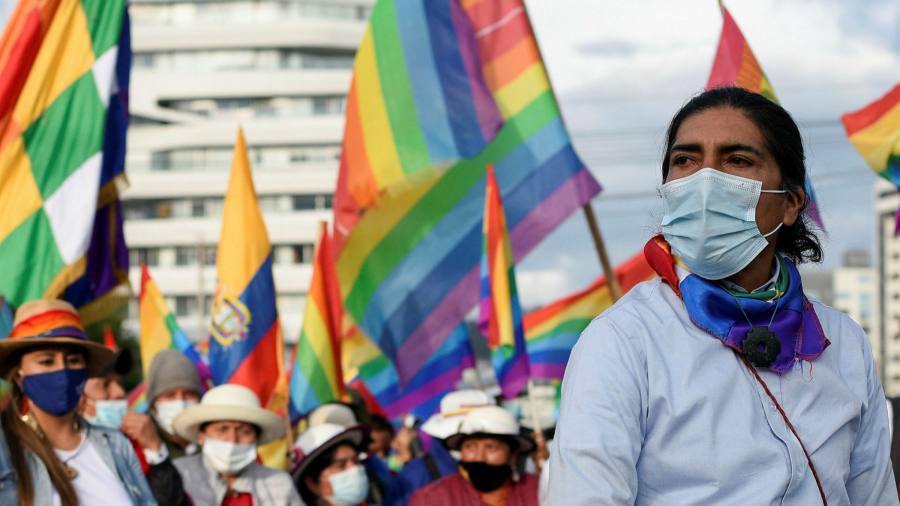[ad_1]
Indigenous leader Yaku Pérez may fail to make the run-off in Ecuador’s presidential race but his party has made big gains in parallel parliamentary polls — sending a signal that voters in the Andean nation are eager for an alternative to the traditional programmes of left and right.
As things stand, Pérez came third in February’s first round of the presidential elections, with 19.4 per cent of the vote. He missed a place in next month’s run-off by just 32,000 votes — less than 0.3 per cent of the ballots cast.
But although the country’s National Electoral Council (CNE) says that leftwing economist Andrés Arauz and conservative businessman Guillermo Lasso will face off in the second round on April 11, Pérez has not given up hope. He is seeking to become the first indigenous leader in Ecuador’s history.
Alleging widespread fraud, he is urging a recount and has appealed to Ecuador’s electoral court in a bid to get the CNE’s results overturned. “If they open the ballot boxes [and recount the vote], then for sure I’ll be in the second round,†he told the Financial Times from his home in the southern Ecuadorean highlands.
He is likely to be disappointed, and Arauz is favourite to win the run-off regardless of who he faces. But Pérez’s Pachakutik party took nearly 17 per cent in the legislative vote and will be the second biggest force in Ecuador’s fragmented new congress.
Arauz’s Union for Hope, a new leftist party set up by former president Rafael Correa, took more than 32 per cent in the legislative elections and will be the dominant group. But it will not have an overall majority and will need to seek alliances — including with Pachakutik, which would likely insist on some of its environmental policies being implemented in return.
The results represent a breakthrough for Pachakutik, which was founded in the 1990s. Until now its support has largely been limited to Ecuador’s indigenous people, who according to the last census make up only 7 per cent of the population.
This time, analysts say, Pachakutik struck a chord with young and disenchanted voters who responded to its call for greater protection of the environment and focus on gender issues.
“This has been a triumph even if we don’t get to the second round,†Pérez said. “Historically we’ve had five members of congress, or in the best case, 10. Now we’ll have 27 — 10 of them women — and that’s a victory in itself.â€
Sebastián Hurtado, head of local political risk consultancy Prófitas, said Pérez “managed to reach a certain part of the electorate that the indigenous movement hadn’t reached beforeâ€.
With the government of LenÃn Moreno deeply unpopular after trying to implement austerity measures to meet the terms of an IMF lending agreement, Pérez was “clearly an outsider in an election in which there’s been an anti-establishment mood and a tendency towards outsidersâ€, said Hurtado.
Pérez has been an environmental campaigner and lawyer for years. Formerly known as Carlos Ranulfo Pérez, he changed his first names to Yaku Sacha four years ago. Yaku means water in Quichua, the predominant language of the Andes, while Sacha means mountainous jungle.

In 1996 he was elected as local councillor in his home city of Cuenca. In 2019, he won the governorship of Azuay, the region of which Cuenca is the capital.
Later that year he came to prominence when Moreno tried to scrap subsidies on fossil fuels to meet IMF demands. The move would have saved the government $1.3bn a year but meant a sharp rise in gasoline and diesel prices. Indigenous activists and leftists took to the streets and after 10 days of clashes in which at least eight people died, the government backed down.
Pérez acknowledged there was “an apparent contradiction†between his defence of fossil fuel subsidies and support for environmental protection. But he argued that ending them in 2019 would have been too onerous for the poor.
“I’d like to stop using fossil fuels and start using clean energy as soon as possible, but while we don’t have clean energy we don’t have any choice,†he said.
Some in Ecuador’s oil and mining industries would be relieved to see Pérez fail. He wants to halt all new mining projects and takes a similar stance on oil exploration and production — the backbone of the economy, accounting for roughly 8 per cent of gross domestic product.
Asked how he would make up the income shortfall, Pérez said any government he led would curb corruption and tax evasion and encourage tourism and agriculture. “We’ve always been an agricultural country and yet we’re importing wheat to make bread, lentils to make soup and fruit from Peru, Colombia and Chile.â€
Observers say Pérez’s grasp of economics is shaky. “He knows nothing about the economy . . . but to his credit he doesn’t claim to,†said Alberto Acosta, editor of Weekly Analysis, a local economic report. “The big question if he ever got into power would be who his economic advisers are.â€
For now, that looks some way off. If the CNE confirms Pérez is not in the April 11 run-off, he said he and his supporters would spoil their ballot papers in a country where voting is obligatory. He would not throw his weight behind Lasso in a bid to keep Arauz — who was virtually unknown until Correa anointed him last year as his chosen candidate — out of power.
Opponents fear Correa, who was barred from running after being convicted in absentia last year on corruption charges, would pull the strings in an Arauz-led government. Pérez has a long history of clashing with Correa over environmental policies during the latter’s 2007-17 rule.
“We will spoil our ballots because we have a third way,†Pérez said. “The way of the ecological left, the feminist left, the communitarian left, the honest left that has its roots in the indigenous people.â€
[ad_2]
Source link





